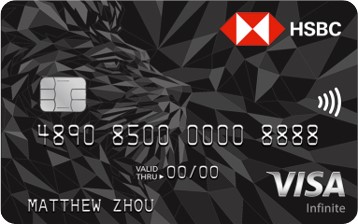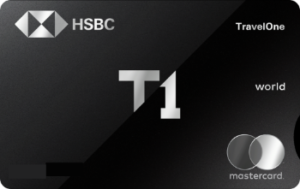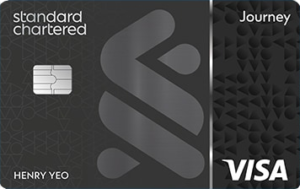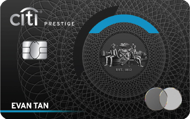Despite the emergence of overseas spending alternatives like Amaze, Revolut and YouTrip, banks seem to have little concern about increasing the foreign currency (FCY) transaction fees on their credit cards.
Over the past few years, we’ve seen the market move out of the 2% range and into 3%. As it stands, there’s only two card issuers still offering sub-3% FCY fees: American Express, and HSBC.
From January 2023, HSBC is going to drop out of that club.
HSBC hikes FCY transaction fee to 3.25%

HSBC currently imposes a 1.8% fee on all FCY transactions, which together with the 1% charged by Mastercard and Visa yields a total FCY fee of 2.8%.
From 4 January 2023, HSBC will be hiking its fee to 2.25%, which together with the Mastercard/Visa fee yields a total of 3.25%. Per an SMS sent to customers:
HSBCSG: With effect from 4 Jan 2023, there will be changes in fees and charges that apply to your HSBC credit card. The changes are for interest rate on purchases, late payment fee and administrative fee for foreign currency transactions. In addition, payment via cheque and 7-Eleven stores will not be available from 4 Jan 2023. For details visit HSBC website > Banking > Explore credit cards
For context, the last time HSBC increased its FCY charge was in November 2018; when it went from 2.5% to 2.8%.
As before, all transactions in USD will be converted into SGD based on the Mastercard/Visa rates before the fee is applied. All transactions in foreign currencies other than USD will be converted into USD before being converted into SGD.
Here’s how HSBC’s fees will measure up to the rest of the market following the change:
| 💳 FCY Fees by Issuer and Card Network | ||
| Issuer | ↓ MC & Visa | AMEX |
| Standard Chartered | 3.5% | N/A |
| Citibank | 3.25% | 3.3% |
| DBS | 3.25% | 3% |
| HSBC | 3.25% |
N/A |
| Maybank | 3.25% | N/A |
| OCBC | 3.25% | N/A |
| UOB | 3.25% | 3.25% |
| BOC | 3% | N/A |
| CIMB | 3% | N/A |
| American Express | N/A | 2.95% |
As the table above shows, most of the market has gravitated towards 3.25%, with American Express now boasting the lowest FCY fee at 2.95%.
Some brief history on how FCY fees have evolved over the past few years:
- On 1 Apr 18, Maybank increased its FCY charge on Visa Diamante, Visa Infinite and World Mastercard from 2.5% to 2.75%
- On 4 Oct 18, Citibank increased its FCY charge from 2.8% to 3%
- On 1 Nov 18, HSBC increased its FCY charge from 2.5% to 2.8%
- On 1 Jan 19, CIMB removed the admin fee waiver for FCY transactions on the Visa Signature and Platinum Mastercard, effectively increasing the fee from 1% to 3%
- On 2 Jan 19, DBS increased its FCY charge from 2.8% to 3%
- On 15 Jan 19, BOC increased its FCY charge on Mastercard transactions from 2.5% to 3% (Visa fees increased from 2.5% to 3% on 1 Dec 18)
- On 15 Mar 19, OCBC increased its FCY charge from 2.8% to 3%
- On 4 Sep 19, UOB increased its FCY charge from 2.8% to 3.1%
- On 1 Nov 19, DBS increased its FCY charge from 3% to 3.25%
- On 3 Dec 19, OCBC increased its FCY charge from 3% to 3.25%
- On 15 Dec 19, Citibank increased its FCY charge from 3% to 3.25%
- On 1 Mar 20, AMEX increased its FCY charge from 2.5% to 2.95%
- On 9 Mar 20, UOB increased its FCY charge from 3.1% to 3.25%
- On 1 Nov 21, Maybank increased its FCY charge from 2.75% to 3.25%
What’s the cost per mile?
With the FCY fee hike, here’s the revised cost per mile (CPM) for HSBC Visa Infinite and HSBC Revolution Cardholders. This is derived by taking the FCY fee divided by the FCY earn rate.
| Card | FCY Earn | FCY Fee | CPM |
 HSBC VI HSBC VI |
2.0/ 2.251 |
3.25% | 1.63/ 1.44 |
 HSBC Revolution HSBC Revolution |
0.4/ 4.02 |
3.25% | 8.13/ 0.81 |
| 1. 2.25 mpd rate with min. S$50,000 spending in the previous membership year, otherwise 1.0 mpd 2. 4 mpd on airlines, hotels, department stores, apparel, supermarkets, transport. Must be online or via contactless payments. Full list here. Capped at first S$1K per calendar month |
|||
Don’t forget there’s also an implicit spread in the rates charged by Mastercard and Visa, which in my experience is about 0.3-0.6% above spot rates.
For example:
- A US$100 transaction should cost S$137.20 at spot rates
- If I charged that to a Visa credit card with zero FCY fees, I’d pay S$138.05 (reflecting a 0.6% spread from Visa)
- If I charged that to a Visa credit card with 3.25% FCY fees, I’d pay S$142.54 (reflecting a 0.6% spread from Visa and 3.25% FCY fee)
| ❓ How much will my overseas transaction cost? |
| If you’re curious as to how much a given foreign currency transaction will cost, you can use the Mastercard or Visa currency converter calculators. All you need to plug-in is the bank’s FCY fee. |
| Mastercard Calculator |
| Visa Calculator |
Is it still worth using your HSBC card overseas then? I’d argue yes, if you have the HSBC Revolution. Earning 4 mpd with a 3.25% fee on airlines, hotels, shopping and supermarkets is a good deal in my book, provided you’ve already maxed out the Amaze + Citi Rewards Card combination for the month.

And even if you haven’t, don’t forget that the Citi Rewards Card does not offer 4 mpd on air tickets and hotel stays, so you might want to turn to the HSBC Revolution as your first choice in that situation.
It’s also important to remember you can earn an extra 1% cashback on your spending through the HSBC Everyday Global Account (EGA), when you perform at least five eligible transactions per month and deposit at least:
- S$2,000 per month, for HSBC Personal Banking
- S$5,000 per month, for HSBC Jade and Premier
The bonus 1% cashback is capped at S$300 per month for HSBC Personal Banking, and S$500 per month for HSBC Jade and Premier customers. This can further offset some of the 3.25% fee.
Conclusion
HSBC will be raising its FCY transaction fee to 3.25% from 4 January 2023, bringing it in line with other banks like DBS, OCBC and UOB.
This won’t change the equation too much for me, in the sense that I’d still be willing to use my HSBC Revolution overseas. However, it is curious that banks are content to edge their fees upwards even with all the competition from multi-currency cards.
American Express now stands alone as the only issuer with a sub-3% fee, and who knows how long that will last?






“Despite the emergence of overseas spending alternatives like Amaze, Revolut and YouTrip, banks seem to have little concern about increasing the foreign currency (FCY) transaction fees on their credit cards. “
You can’t get miles from those three. But signing directly u can.
you can absolutely get miles from Amaze.
burnnnnnnnnnnnnnnnnnnnnnn
No reminder of the EGA 1% cashback on top of your regular miles earn for HSBC cards? Surprised this doesn’t get a constant plugging everytime HSBC cards are mentioned.
good point! have added.
Shouldn’t you deduct the miles you can get if you pair the Amaze with a ‘dummy’ mastercard? Yes I get 4MPD with the revolution, but Amaze and Citi Prestige/Premiermiles gives my 1.2. So its 2.8 extra miles for 3.25%
fair point. if you have those cards and want to be even more precise you can definitely do that.
TIL that Amex has the lowest forex charge. I always assumed they had the highest based on their premium branding.
Aaron — veering little bit off topic, but is Amaze getting nerfed? I had 2 transactions in the past 2 days, one converting to SGD5XX, and the other SGD9XX. Each earned me exactly 500 instapoints. I used to earn non-round numbers approximately at approx 1 IP/SGD, and as recently as mid-Oct i’ve gotten >1K IPs in a single transaction. Is Amaze applying some sort of cap or rounding policy per txn? Thought you may wish to consider.
Max only 500 IPs per transaction. So anything above $500 won’t earn IPs
all transactions capped at 500 IP. this was announced a few months back when they made the changes
Ah! Dang missed that one. Thanks for update!
Amex cards doesn’t 4mpd. So hopefully they keep the forex fees lower. But who knows…….
Anyway AMEX is pretty useless card when travelling lot of street shops dont accept AMEX, only you can use in shopping center, i experienced this in london recently.
All HSBC USA credit cards do not charge any foreign currency transaction fees, and you can get an unlimited cash back of 1-3%.
In Singapore and Hong Kong and the United Kingdom will charge expensive foreign currency transaction fees, just like robbery.